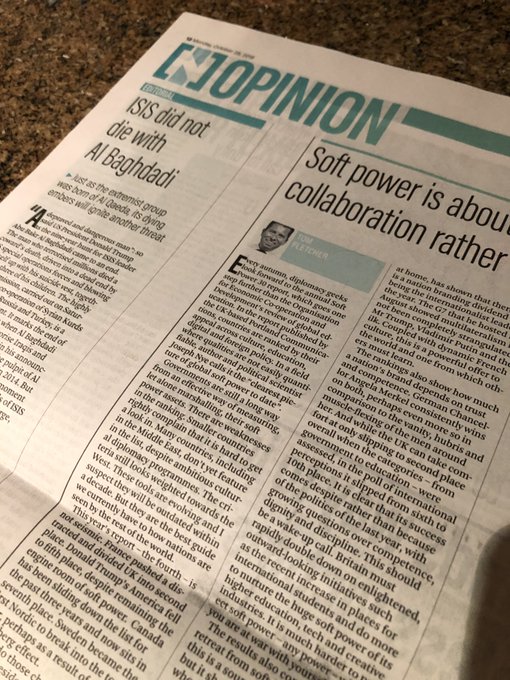Article

Soft power is about attraction rather than coercion
Every autumn, diplomacy geeks look forward to the annual Soft Power 30 report, which goes one step further than the Organisation for Economic Co-operation and Development's review of global education. In the report published by the UK-based Portland Communications, countries are ranked by their appeal across culture, education, digital and foreign policy. In a field where qualities are not easily quantifiable, author and political scientist Joseph Nye calls it the “clearest picture of global soft power to date”.
Governments are still a long way from an effective way of measuring, let alone marshalling, their soft power assets. There are weaknesses in the ranking. Smaller countries rightly complain that it is hard to get a look in. Many countries, including in the Middle East, don’t yet feature in the list, despite ambitious cultural diplomacy programmes. The criteria still looks weighted towards the West. These tools are evolving and I suspect they will be outdated within a decade. But they are the best guide we currently have to how nations are seen by the rest of the world.
This year’s report – the fourth – is not seismic. France pushed a distracted and divided UK into second place. Donald Trump’s America fell to fifth place, despite remaining the engine room of soft power. Canada has been sliding down the list for the past three years and now sits in seventh place. Sweden became the first Nordic to break into the top four, perhaps as a result of the Greta Thunberg effect.
What do those changes tell us? French President Emmanuel Macron, more popular abroad than at home, has shown that there is a nation branding dividend to being the internationalist leader of the year. The G7 that he hosted in August showed multilateralism had not been completely strangulated by Mr Trump, Vladimir Putin and their ilk. Coupled with dynamic French culture, this is a powerful offer to the world and one from which others must learn.
The rankings also show how much a nation’s brand depends on trust and competence. German Chancellor Angela Merkel consistently wins on both, perhaps even more so in comparison to the vanity, hubris and muscle-flexing of the men around her. And while the UK can take comfort at only slipping to second place overall when the categories – from government to education – were assessed, in the poll of international perceptions it slipped from sixth to 10th place. It is clear that its success comes despite rather than because of the politics of the last year, with growing questions over competence, dignity and discipline. This should be a wake-up call. Britain must rapidly double down on enlightened, outward-looking initiatives such as the recent increase in places for international students and do more to nurture the huge soft power of its higher education, tech and creative industries. It is much harder to project soft power – any power – when you are at war with yourself.
The results also confirm America’s retreat from soft power. Perhaps this is a source of pride to Mr Trump but it should trouble those of us who continue to hope for a renewal of US leadership. Credibility has a price and every erratic midnight tweet reduces it. As Nye points out, Mr Trump is not the first president to lie. But even his defenders should admit that he is the first to do so as consistently, loudly and – armed with social media – visibly. The question now is how fast America can bounce back in the post-Trump era. Either way, this period will leave a renewed sense of inconsistency and unreliability. And I suspect that the inability of parts of US big tech to reform could also move them from the positive to the negative column. The US president elected in 2020 cannot take for granted the leadership of the free world.
Behind these immediate moves, I think there are bigger questions for all of us.
Is soft power itself in retreat? Maybe as a government policy in an age of greater national protectionism. Soft power is by nature collaborative, less aggressive than its hard counterpart. The zero-sum approach to the world taken by a growing number of leaders is not fertile ground for co-operation.
But the most effective soft power has always been bottom up. No British government asked The Beatles to write Let It Be. No Swedish government sought out Ms Thunberg and asked her to challenge us to rethink the world we leave behind. The great hope for those of us who continue to defend optimism about human progress is that citizens themselves will continue to create the art, music and ingenuity that bring us closer as humans rather than drive us apart. Perhaps those countries that have invested heavily in soft power in recent years but not seen their trust scores go up might also reflect that real soft power flourishes when people are free to be creative.
Ultimately, soft power is about attraction rather than coercion. It requires nations to want to be magnetic. This is a bigger question for Britain than Brexit. For those that top this table in 2020, the new questions are becoming clearer: do we want to attract or repel people? What effect does the way we talk to each other, about each other, and to the world about our nation, have? Are we spending more time and money on the process or the outcome? Do we care more about our hierarchy or our networks? Are we purely about communicating culture, or ready to protect and nurture the places where culture interacts and creativity flourishes? And are we willing to sacrifice the illusion of control for the freedom that allows future generations of creative talent the space to truly flourish?

